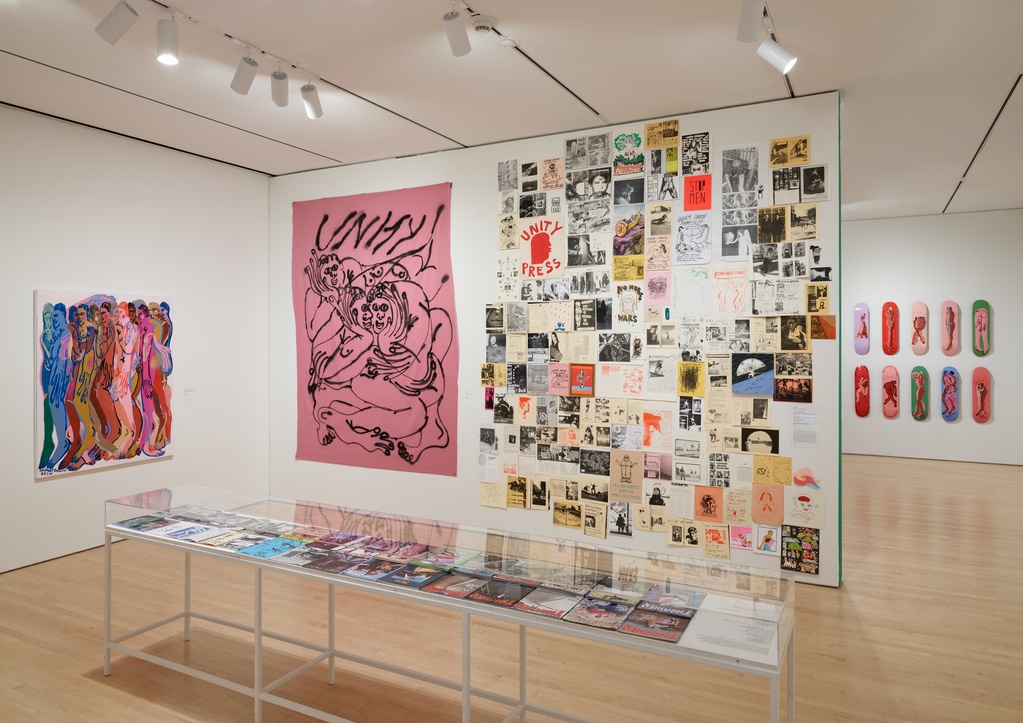“Unity Through Skateboarding” takes up two rooms at the San Francisco Museum of Modern Art, but it’s enormous. With vibrant color, radical design, nostalgic or iconic references, it tells long overdue stories of skaters and artists who are women, queer, trans, or people of color.
The exhibit, on view through April 25, 2025, complements SFMOMA’s upcoming “Get in the Game: Sports, Art, Culture,” an exhibition running Oct. 19 – Feb. 18, 2025 highlighting the importance of sports and athletic activities in culture, history and contemporary society.
The origins of “Unity in Skateboarding” trace back to 2017, when a collective of Oakland queer and trans people determined that they would have to act themselves if they wanted to be represented equitably in the current and future landscape of skateboarding. Founded by Jeffrey Cheung and Gabriel Ramirez, the Oakland-based skate collective Unity was organized to celebrate and bring together queer, trans, Black, indigenous, people of color and women skaters.
In meetup events, participants created and shared impressive artworks and artifacts—banners, hand-rendered skate decks, photographs, drawings, paintings, videos, zines and other publications.
SFMOMA’s “Unity in Skateboarding,” curated by Cheung and Ramirez, illuminates under-told stories of skaters, countering hypermasculine, exclusionary attitudes often associated with the sport.
It includes 48 hand-painted skate decks, multi-image photo walls, looped videos displayed on six monitors, wall displays of zines, printed articles, handwritten notes and display cases filled with magazines, ephemera and artifacts.

The skate deck wall showcases queer people and women whose professional models and brands came into prominence only after receiving support from queer- and women-owned companies.
Seminal skating figures represented by decks include 1990s legends from the Embarcadero (SF EMB) era and women-, queer, or trans-owned brands such as Rookie, Meow, hoopla, Glue and THERE.
Many decks are notable for their artistry, displaying fine drafting skill or stylistic power, striking symbolism, raw humor, blatant protest or broad satirical comment delivered in small-scale, minimalist format.
What all the decks have in common are intrigue: What are the stories behind these unique individuals and the significant, landmark moments they hold in skateboarding history?
A montage of stacked monitors in three towers shows iconic video clips, an assortment of girls skating network videos, recent films and videos from Unity’s archive that include queer skate submissions from the collective’s earliest days.
Watching the looping videos more than one time offers a metaphoric experience. Unlike the world that overlooked these skaters and cannot perform a “do-over,” a viewer upon second sighting will see details missed the first time. Here, the televisions seem to proclaim, “Here is an opportunity to fully see us, to make right, and not continue, a wrong.”

Magazines, zines and artifacts and the photo board wall bring to light the vastness of the queer, trans, people of color and women’s skating network. While the Bay Area is prominently represented, the displays also showcase companies, clubs, collectives, publications and communities from other U.S. cities (Chicago, Los Angeles, New York) as well as Mexico, Berlin, Palestine, Ethiopia and Canada.
Interestingly, Unity, which started as a music project, grew to become a publisher, event host, living archival repository, community treasure and exhibitor. It has claimed its community’s rightful place in skateboarding history, offering a model of equitable visibility in stories and experiences to come.
“Unity through Skateboarding” continues through April 27, 2025 at the San Francisco Museum of Modern Art, 151 Third St., San Francisco. Admission is $30 general; $25 senior; $23 students; free for ages 18 and younger. Visit sfmoma.org.
The post Diversity, equity celebrated in colorful SFMOMA skateboarding exhibition appeared first on Local News Matters.
